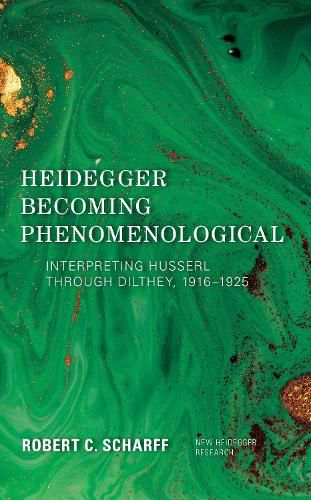Readings Newsletter
Become a Readings Member to make your shopping experience even easier.
Sign in or sign up for free!
You’re not far away from qualifying for FREE standard shipping within Australia
You’ve qualified for FREE standard shipping within Australia
The cart is loading…






In this first book-length study of the topic, Robert C. Scharff offers a detailed analysis of the young Heidegger’s interpretation of Dilthey’s hermeneutics of historical life and Husserl’s transcendental phenomenology. He argues that it is Heidegger’s prior reading of Dilthey that grounds his critical appropriation of Husserl’s phenomenology. He shows that in Heidegger’s early lecture courses, a possible phenomenology is presented as a genuine alternative with the modern philosophies of consciousness to which Husserl’s actual phenomenology is still too closely tied. All of these philosophies tend to overestimate the degree to which we can achieve intellectual independence from our surroundings and inheritance. In response, Heidegger explains why becoming phenomenological is always a possibility; but being a phenomenologist is not. Scharff concludes that this discussion of the young Heidegger, Husserl, and Dilthey leads to the question of our own current need for a phenomenological philosophy-that is, for a philosophy that avoids technique-happiness, that at least sometimes thinks with a self-awareness that takes no theoretical distance from life, and that speaks in a language that is not yet selectively representational.
$9.00 standard shipping within Australia
FREE standard shipping within Australia for orders over $100.00
Express & International shipping calculated at checkout
In this first book-length study of the topic, Robert C. Scharff offers a detailed analysis of the young Heidegger’s interpretation of Dilthey’s hermeneutics of historical life and Husserl’s transcendental phenomenology. He argues that it is Heidegger’s prior reading of Dilthey that grounds his critical appropriation of Husserl’s phenomenology. He shows that in Heidegger’s early lecture courses, a possible phenomenology is presented as a genuine alternative with the modern philosophies of consciousness to which Husserl’s actual phenomenology is still too closely tied. All of these philosophies tend to overestimate the degree to which we can achieve intellectual independence from our surroundings and inheritance. In response, Heidegger explains why becoming phenomenological is always a possibility; but being a phenomenologist is not. Scharff concludes that this discussion of the young Heidegger, Husserl, and Dilthey leads to the question of our own current need for a phenomenological philosophy-that is, for a philosophy that avoids technique-happiness, that at least sometimes thinks with a self-awareness that takes no theoretical distance from life, and that speaks in a language that is not yet selectively representational.